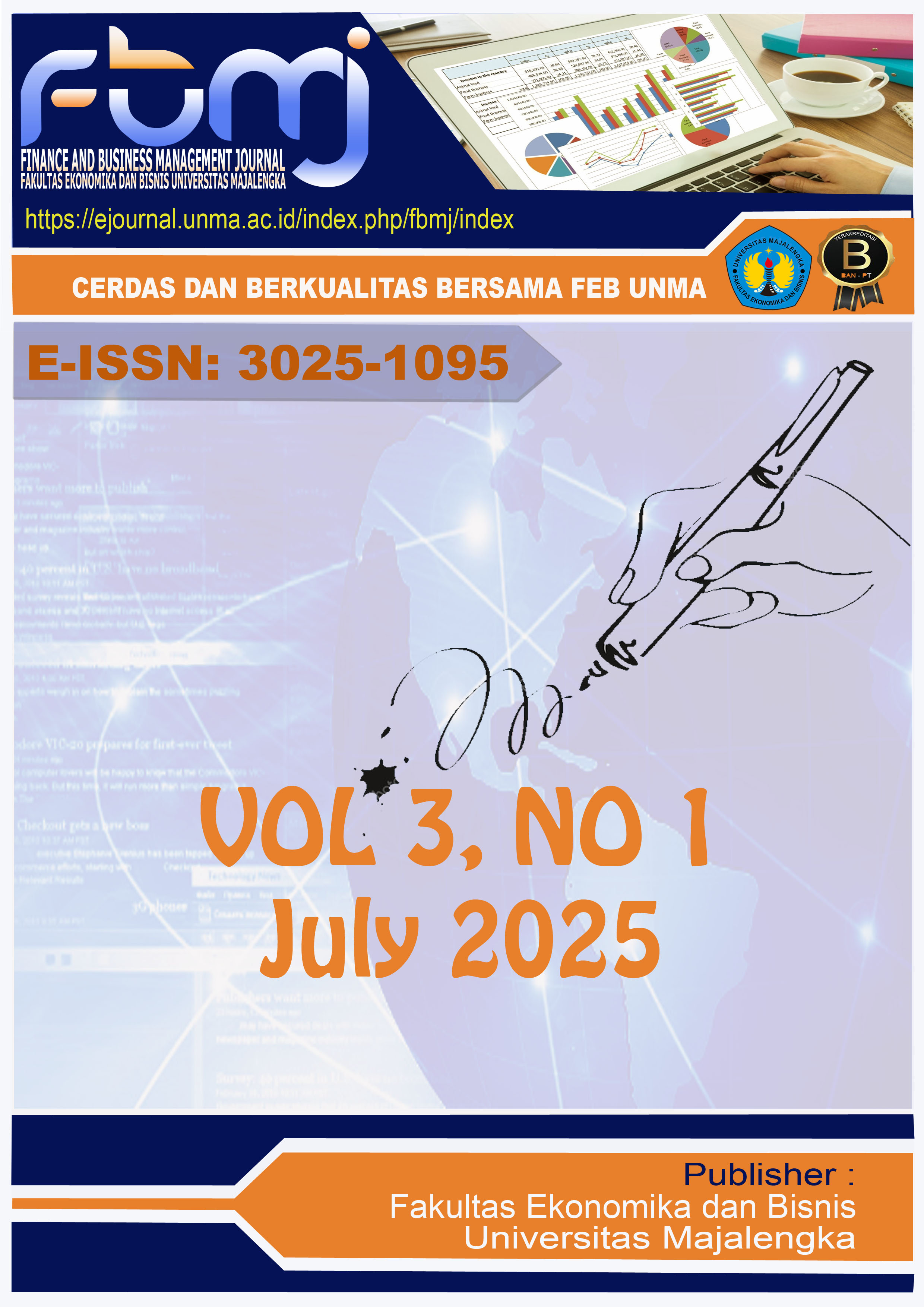The Influence of Government Accounting Standards, Educational Level, and Utilization of Information Technology on the Quality of Financial Reports
DOI:
https://doi.org/10.31949/fbmj.v3i1.14799Abstract
Management of village funds in Indonesia still faces various challenges that hinder the effectiveness of development and highlight issues related to the utilization of funds, along with the need for high-quality village financial reports. This study aims to examine the influence of government accounting standards, educational level, and the use of information technology on the quality of financial reports. The research was conducted on all financial officials in 14 villages in Kertajati Subdistrict, Majalengka Regency. The sampling technique used was purposive sampling, resulting in 70 respondents consisting of village heads, village secretaries, and heads of divisions/sections (financial affairs, planning affairs, and governance sections). The method employed was a survey with a descriptive and verificative approach. Data analysis was conducted using multiple linear regression with the assistance of SPSS version 26. The results of the study indicate that government accounting standards significantly influence the quality of financial reports. The educational level of village officials also affects the quality of financial reports. Additionally, the utilization of information technology has a significant positive impact on the quality of financial reports.
Keywords:
Educational level, financial report quality, government accounting standards, utilization of information technologyDownloads
References
Aliyudin, A., Prasetyo, M. A., & Putra, A. P. (2023). Pemanfaatan teknologi informasi dalam meningkatkan efisiensi penyusunan laporan keuangan desa. Jakarta: Penerbit Ekonomi Digital Nusantara.
Andriyani, P., & Sulistyowati. (2021). Proses penyusunan laporan keuangan desa yang berkualitas. Jurnal Akuntansi dan Pemerintahan, 9(2), 112–123.
Arza, F., Nurhidayat, R., & Lestari, W. (2021). Transparansi dan akuntabilitas laporan keuangan desa dalam perspektif regulasi. Jurnal Kebijakan dan Administrasi Publik, 15(1), 33–45.
Aziiza, A. N., & Susanto, H. (2020). Peran strategis desa dalam pembangunan nasional. Jurnal Pembangunan Daerah, 12(1), 1–9.
Binawati, E., & Nindyaningsih, A. (2022). Kualitas informasi dalam laporan keuangan sektor publik. Jurnal Akuntabilitas Pemerintahan, 10(1), 55–67.
Cakranegara, A., Raharja, S., & Mutmainah, L. (2022). Standar akuntansi pemerintahan desa dan peningkatan kualitas laporan keuangan. Jurnal Tata Kelola dan Akuntabilitas Keuangan Negara, 8(1), 22–35.
Deze, R., Rahman, A., & Hidayat, T. (2023). Pengaruh latar belakang pendidikan aparatur terhadap kualitas laporan keuangan desa. Jurnal Ilmu Pemerintahan dan Keuangan, 5(2), 78–88.
Ginanjar, Y., & Syamsul, R. (2020). Implementasi PSAK dan SAP di pemerintahan desa. Jurnal Akuntansi Publik, 14(1), 17–27.
Ginanjar, Y., Kurniawan, A., & Nurul, A. (2023). Pendidikan sebagai penunjang kompetensi pengelolaan keuangan desa. Jurnal Pendidikan dan Ekonomi, 6(1), 42–50.
Hadis, A. (2022). Siskeudes dan pengaruhnya terhadap kualitas laporan keuangan desa. Jurnal Sistem Informasi Pemerintahan, 3(1), 11–21.
Hasliani, H., & Yusuf, M. (2021). Dana desa sebagai instrumen pembangunan berkelanjutan. Jurnal Keuangan Publik, 7(2), 66–77.
Hendri, A., & Erinos, H. (2020). Kendala penggunaan teknologi informasi dalam penyusunan laporan keuangan desa. Jurnal Teknologi Informasi dan Pemerintahan, 4(1), 93–104.
Hermawan, R. (2022). Optimalisasi pemanfaatan dana desa: Tantangan dan strategi. Jurnal Ekonomi Desa, 11(1), 45–59.
Kompas.com. (2024). ICW Catat 187 Kasus Korupsi Dana Desa Sepanjang 2023. Diakses dari: [https://www.kompas.com/](https://www.kompas.com/)
Maghfiroh, R., Sari, D. P., & Huda, N. (2022). Pengaruh pendidikan terhadap kualitas laporan keuangan desa. Jurnal Riset Akuntansi dan Pemerintahan, 9(3), 124–135.
Maulana, M. (2021). Laporan keuangan berkualitas sebagai cermin tata kelola desa yang baik. Jurnal Akuntansi dan Etika Pemerintahan, 6(2), 77–88.
Mawarni, A., & Nuraini, T. (2021). Pendidikan aparatur desa dan pengaruhnya terhadap penyusunan laporan keuangan. Jurnal Pendidikan dan Akuntabilitas, 8(1), 90–102.
Rahman, A., & Iqbal, M. (2019). Kontribusi SAP terhadap akuntabilitas keuangan desa. Jurnal Akuntansi Sektor Publik, 5(2), 33–44.
Siallagan, M. (2022). Strategi peningkatan pengawasan dana desa melalui partisipasi masyarakat. Jurnal Kebijakan Publik, 7(1), 29–40.
Widyaningrum, I., & Purwanto, A. (2022). Indikator kualitas laporan keuangan desa. Jurnal Audit dan Akuntabilitas Publik, 5(2), 56–67.
Widayati, N., & Abdurahim, F. (2022). Kualitas SDM dan dampaknya terhadap laporan keuangan desa. Jurnal Ilmu Akuntansi dan Keuangan Publik, 8(2), 101–110.
Yanti, R., Lestari, R. D., & Anggraeni, T. (2020). Pengaruh standar akuntansi pemerintah terhadap kualitas laporan keuangan pemerintah daerah. Jurnal Riset Akuntansi dan Keuangan Daerah, 4(2), 67–78.

Published
How to Cite
Issue
Section
License
Copyright (c) 2025 Robi Maulana Magribi, Yogi Ginanjar, Ai Lia Mustika

This work is licensed under a Creative Commons Attribution-ShareAlike 4.0 International License.
An author who publishes in the Finance and Business Management Journal agrees to the following terms:
- Author retains the copyright and grants the journal the right of first publication of the work simultaneously licensed under the Creative Commons Attribution-ShareAlike 4.0 License that allows others to share the work with an acknowledgment of the work's authorship and initial publication in this journal
- The author is able to enter into separate, additional contractual arrangements for the non-exclusive distribution of the journal's published version of the work (e.g., post it to an institutional repository or publish it in a book) with the acknowledgment of its initial publication in this journal.
- The author is permitted and encouraged to post his/her work online (e.g., in institutional repositories or on their website) prior to and during the submission process, as it can lead to productive exchanges, as well as earlier and greater citation of the published work













